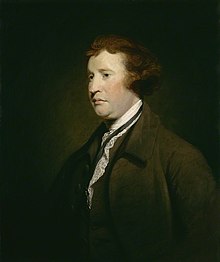
Back Edmund Burke Afrikaans إدموند بيرك Arabic ادموند بيرك (فيلسوف من مملكه ايرلاندا) ARZ এডমাণ্ড বাৰ্ক Assamese Edmund Burke AST Edmund Börk Azerbaijani ادموند برک AZB Эдмунд Бёрк Byelorussian Эдмунд Бэрк BE-X-OLD Едмънд Бърк Bulgarian
Edmund Burke | |
|---|---|
 Potret s. 1767, lukisan Joshua Reynolds (1723–1792) | |
| Maklumat peribadi | |
| Lahir | 12 Januari 1729 Dublin, Ireland[1] |
| Mati | 9 Julai 1797 (umur 68) Beaconsfield, England |
| Parti politik | Parti Whig puak Rockingham (Rockinghamite) |
| Pasangan | Jane Mary Nugent (k. 1757) |
| Anak | Richard Burke Jr. |
| Tempat belajar | Trinity College, Dublin |
| Pekerjaan | penulis, ahli politik, wartawan, filsuf |
Edmund Burke | |
|---|---|
Karya terkenal | A Philosophical Enquiry into the Origin of Our Ideas of the Sublime and Beautiful |
| Era | Abad-abad ke-18/-19 |
| Falsafah | falsafah Barat |
| Sekolah | Konservatisme liberal[2] |
Kepentingan utama | Falsafah-falsafah sosial dan politik |
Idea cemerlang | Serapan estetika, Sublim kesusasteraan |
Edmund Burke ([éd-mund bĕk]; 12 Januari [NS] 1729[nota 1] – 9 Julai 1797) ialah seorang negarawan, penulis, pemidato, pakar teori politik dan ahli falsafah kelahiran Dublin, Ireland.[3][4][5] Beliau menjadi ahli parlimen United Kingdom mewakili Parti Whig dalam Dewan Rakyat Great Britain antara tahun-tahun 1766 dan 1794.
Pemikiran beliau diamati ramai sebagai asas kepada fahaman politik konservatisme moden sejak abad ke-20.[6][7]
- ^ "Edmund Burke". Library Ireland. Diarkibkan daripada yang asal pada 20 Oktober 2017. Unknown parameter
|deadurl=ignored (bantuan) - ^ Lakoff, Sandoff. "Tocqueville, Burke, and the Origins of Liberal Conservatism". The review of politics. 60 (3): 435–46year=1998. doi:10.1017/S003467050002742X.
- ^ Clark 2001, p. 25: "Edmund Burke was an Irishman, born in Dublin but in an age before 'Celtic nationalism' had been constructed to make Irishness and Englishness incompatible: he was therefore free also to describe himself, without misrepresentation, as 'a loyalist being loyal to England' to denote his membership of the wider polity. He never attempted to disguise his Irishness (as some ambitious Scots in eighteenth-century England tried to anglicise their accents), did what he could in the Commons to promote the interests of his native country and was bitterly opposed to the Penal Laws against Irish Catholics."
- ^ Hitchens, Christopher (April 2004). "Reactionary Prophet". The Atlantic.
Edmund Burke was neither an Englishman nor a Tory. He was an Irishman, probably a Catholic Irishman at that (even if perhaps a secret sympathiser), and for the greater part of his life he upheld the more liberal principles of the Whig faction.
- ^ "BBC - History - Edmund Burke". BBC. Dicapai pada May 18, 2018.
- ^ Heywood, Andrew (2003). Political Ideologies: An Introduction. edition=ke-3. Palgrave Macmillan. m/s. 74. Missing pipe in:
|title=(bantuan) - ^ F. P. Lock, Edmund Burke. Volume II: 1784–1797 (Clarendon Press, 2006), m/s. 585.
Ralat petik: Tag <ref> wujud untuk kumpulan bernama "nota", tetapi tiada tag <references group="nota"/> yang berpadanan disertakan